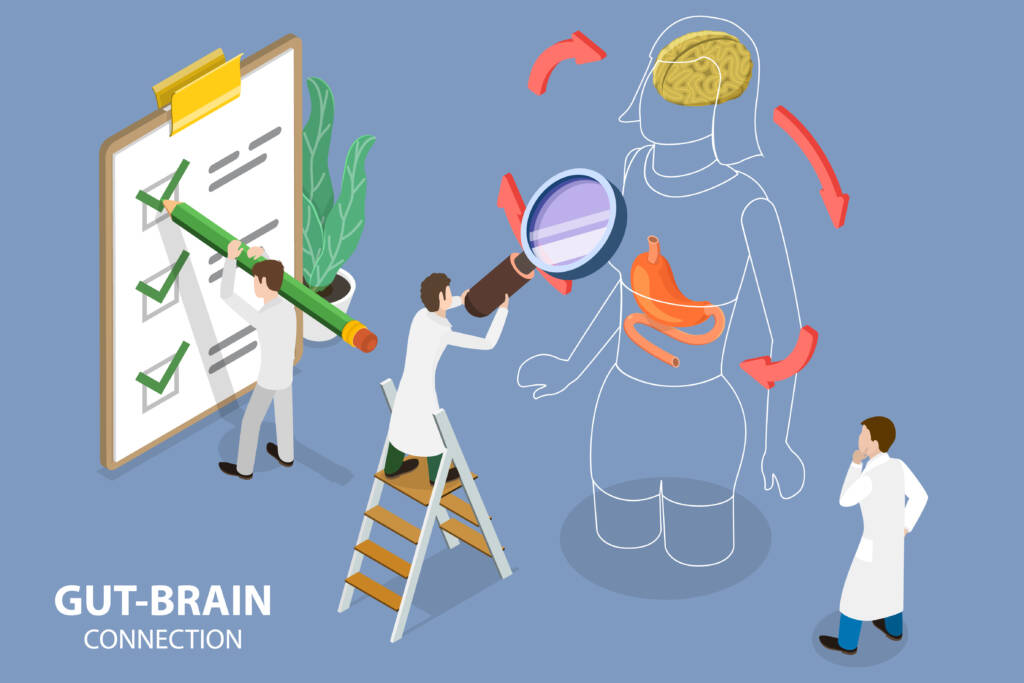Digestive Health, Immunity, Sleep
The Gut-Brain Axis: 7 Affirmative Facts You Should Know
The gut-brain axis is a complex communication network that links the gastrointestinal tract and the brain. Understanding this connection is important as it impacts various aspects of your health, including mood, sleep, and stress levels. Let’s take a closer look at the facts you should know about how your gut and brain link and what it means for your overall health. You may be surprised by just how much this connection influences the function of your entire body and the influence it has on your overall health.

1. The Gut-Brain Axis Influences Mood
The gut-brain axis plays a significant role in regulating mood. The gut produces neurotransmitters like serotonin, often called the “happy hormone,” which influences your overall mood and emotional well-being. Approximately 90% of serotonin is produced in the gut, highlighting the importance of gut health in managing mood disorders such as depression and anxiety.
2. Affects Sleep Patterns
The gut-brain axis also impacts sleep. The gut microbiome influences the production of sleep-regulating hormones, including melatonin. As you know, lack of proper sleep can have a negative impact on your ability to think or process information. A balanced gut microbiome can promote better sleep quality by ensuring the proper production of these hormones. Disruptions in the gut-brain axis can lead to sleep disturbances, affecting overall health and well-being.
3. Stress Response and the Gut-Brain Axis
Stress significantly affects the connection between your gut and your brain. Chronic stress can disrupt the gut microbiome, leading to digestive issues and worsening stress responses. Conversely, a healthy gut can help regulate stress hormones like cortisol, mitigating the adverse effects of stress. It’s incredibly important too.
4. Role in Cognitive Function
The gut-brain axis is also essential for cognitive function. Emerging research suggests that gut health can influence cognitive abilities such as memory, learning, and decision-making. The gut microbiome produces metabolites that can cross the blood-brain barrier and impact brain function. Based on this, a healthy gut is linked to better cognitive performance and a lower risk of neurodegenerative diseases.
5. Immune System Regulation
The gut-brain axis is integral to immune system regulation. The gut microbiome interacts with the immune system to maintain a balanced immune response. A healthy gut helps prevent excessive inflammation and supports the body’s defense mechanisms. This regulation is crucial for preventing chronic inflammatory conditions and ensuring overall immune health.
6. Influence on Appetite and Satiety
The gut-brain axis also regulates appetite and satiety. The gut communicates with the brain to signal hunger and fullness through hormones like ghrelin and leptin. A balanced gut microbiome ensures these signals are correctly interpreted, helping to maintain a healthy weight and prevent overeating or undereating. Maintaining a healthy weight has many health benefits and can help you avoid a variety of health issues, such as heart disease or diabetes.
7. Probiotics and the Gut-Brain Axis
Probiotics can positively influence the gut-brain axis. These beneficial bacteria help restore and maintain a healthy gut microbiome, enhancing communication between the gut and brain. Probiotic-rich foods like yogurt, kefir, and fermented vegetables can improve mood, reduce stress, and enhance cognitive function by supporting gut health.
Conclusion
The gut-brain axis is a vital communication network that significantly impacts various aspects of our health, including mood, sleep, stress, cognitive function, immune regulation, and appetite control. Maintaining a healthy gut through diet, probiotics, and stress management is essential for overall well-being. Understanding and supporting this connection can lead to improved mental and physical health well into the future.
References:
Like? Please share with your friends!
For more information on how Kefiran can offer your gut proper digestive support.

